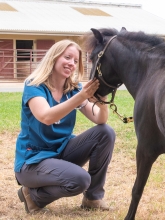Jennifer Cassano, DVM, Ph.D.
Jennifer Cassano
Faculty Mentor: Dr. Lisa Fortier
Current Position: Assistant Professor of Equine Internal Medicine (Field Service), University of California at Davis
Brief Biography
Jennifer Cassano grew up in Valley Stream, NY, right next to Queens at the beginning of Long Island. As an undergraduate, she became interested in adding the idea of becoming a teacher to her dream of being a veterinarian. Her undergraduate research thesis involved a project using genetics, immunology, and virology to analyze equine sarcoid in the laboratory of Dr. Doug Antczak. She applied to the degree program to realize her dream of combining her passions for veterinary medicine, teaching, and research. After completing her DVM degree in May 2013 she joined Dr. Lisa Fortier’s laboratory with the support of the College’s Graduate Research Assistantship. She completed her thesis entitled “Reciprocal interactions between mesenchymal stem cell regenerative medicine modalities and the inflammatory recipient environment” in May 2016 and received her PhD. She then went on to complete a large animal medicine clinical internship at the Cummings School of Veterinary Medicine at Tufts University, Grafton, MA and afterwards practiced large animal medicine in central Massachusetts for two years. In 2019, she started at UC Davis as an Assistant Professor of Equine Internal Medicine (Field Service), where she is a general practitioner in equine field service and runs a research program in regenerative medicine modalities and improving equine field medicine practice.
She is an alumna of the Cornell Veterinary Investigator Program and the Cornell Leadership Program.
Jennifer enjoys spending time with her husband and two kids. She continues to explore California and often thinks fondly of her time in Ithaca.
Education
PhD, Comparative Biomedical Sciences, Cornell University, 2016
DVM, Veterinary Medicine, Cornell University 2013
BS in Animal Science, Magna Cum Laude, Distinction in Research, Cornell University 2009
Research Interests
My research seeks to better understand regenerative medicine modalities' clinical performance and to improve equine field medicine by evaluating clinical practice questions through research. My clinical focus is equine preventative medicine, management of equine metabolic diseases, and ophthalmology. As an educator I seek to promote mental health and wellness in the veterinary profession.
Publications and Presentations
Bernardino PN, Smith WA, Galuppo LD, Mur PE, Cassano JM. Therapeutics prior to mesenchymal stromal cell therapy improves outcome in equine orthopedic injuries. Am J Vet Res. 2022;83(10).
Hisey EA, Martins BC, Donnelly CG, Cassano JM, Katzman SA, Murphy CJ, Thomasy SA, Leonard BC. Identification of putative orthologs of clinically relevant antimicrobial peptides in the equine ocular surface and amniotic membrane. Vet Ophthalmol. 2022; Nov:1-9.
Cassano JM, Marycz K, Horna M, Nogues MP, Morgan JM, Herrmann DB, Galuppo LD, Vapniarsky N. Evaluating the Safety of Intra-Articular Mitotherapy in the Equine Model: A Potential Novel Treatment for Osteoarthritis. J Equine Vet Sci. 2023;120:104164.
Cassano JM, Leonard B, Da Costa B, Vapniarsky N, Dow S, Wotman K, Pezzanite LM. Preliminary evaluation of safety and migration of immune activated mesenchymal stromal cells administered by subconjunctival injection for equine recurrent uveitis. Front Vet Sci. 2023 Dec 14:10:1293199.
Renaudin C, Wensley F, Morgan J, Cassano JM, Spriet M. Transrectal ultrasonographic assessment of the fetal proximal phalanx: A new tool to assess fetal age and bone development in horses. Theriogenology. 2024 Sep 15:226:167-172.
Best AT, Morgan JM, Burgy CL, Flynn H, Barter L, Cassano JM^. A blinded crossover study design to evaluate midazolam as an adjunct for equine standing sedation for routine oral examinations. J Equine Vet Sci. 2024 Sep 27:143:105201.
Wanakumjorn P, Kimura K, Castillo D, McLarty E, Formaker R, Qiao R, Farrell K, Brostoff T, Ramarapu R, Pires J, Cohen-Davidyan T, Cassano J, Murphy B, Reagan K, Kol A. Mesenchymal stem/stromal cell therapy improves immune recovery in a feline model of severe coronavirus infection. Stem Cells Transl Med. 2025 Jul 15;14(7)
Windsor R, Stewart S, Cassano JM, Arzi B, Williams V, Black L, Wilson-Robles H, Khanna C, Borjesson D, Huentelman M. Intravenous Allogenic Mesenchymal Stem Cell Therapy in 11 Pugs with Presumptive Early Necrotizing meningoencephalitis. JAVMA. ** IN PRESS 2025**.
Khajili E, Marycz K, Horna M, Morgan JM, Galuppo LD, Vapniarsky N, Cassano JM. Platelet-derived mitochondrial preparation did not alter early inflammatory markers in a bilateral LPS-induced model of equine synovitis. AJVR. ** IN PRESS 2025**.
Complete List of Published Work in MyBibliography:
https://www.ncbi.nlm.nih.gov/myncbi/jennifer.cassano.1/bibliography/public/



